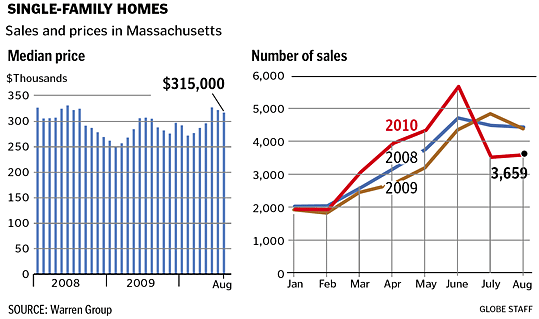In Mass., home purchases fall 19%, condo deals 23%
It was the worst August in more than two decades for Massachusetts home sales as the state’s housing market continued to adjust to the end of the federal tax credit for home buyers, a Boston real estate tracking firm reported yesterday.
Tweet Be the first to Tweet this!Yahoo! Buzz ShareThis Sales of single-family homes fell nearly 19 percent from a year earlier, while condominium sales dropped 23 percent — the second consecutive month of steep year-over-year declines, according to Warren Group. It was the lowest level of August sales since the firm began tracking such data in 1987.
The Massachusetts Association of Realtors, which follows a slightly narrower swatch of the housing market, reported similar declines.
The decline in sales was expected, given the surge in previous months as buyers rushed to take advantage of an expiring federal tax credit of up to $8,000. With the distortions caused by the tax credit, analysts said, it is unclear where the local housing market is heading.
But rising prices suggest housing has at least stabilized. Both Warren and the realtors group recorded increases — about 4 and 5 percent, respectively — from August 2009, pushing the median price of a single-family home above $300,000.
A different measure of home prices, the widely respected Standard & Poor’s/Case-Shiller index, showed Boston-area prices climbed nearly 3 percent in July from a year earlier.
“We’re bouncing along the bottom,’’ said Karl Case, economics professor emeritus at Wellesley College and co-creator of the index. “As long as the economy continues to get better, and the Fed keeps interest rates low, the housing market will pick up.’’
Economists are scrutinizing the housing market to see if it can recover without federal stimulus programs. Home sales in both the state and nation fell sharply in July, after most of the sales supported by the tax credit had closed.
Nationally, sales rebounded a bit in August from the July lows, according to the National Association of Realtors, which adjusts the data for seasonal variations to allow statistically valid month-to-month comparisons. Neither Warren Group nor the Massachusetts Association of Realtors make such an adjustment.
In August, however, the year-over-year declines moderated from July, when single-family home sales fell nearly 30 percent. Analysts and real estate officials expect monthly sales to remain below 2009 levels through the rest of the year, because of the effect of tax credit.
Other factors, such as stubbornly high foreclosure and unemployment rates, are also expected to keep pressure on housing.
Ultimately, a stronger economy that creates more jobs is what’s needed to drive — and sustain — a housing rebound, analysts said. Despite record-low interest rates, many potential buyers lack the confidence to make a purchase.
“Housing markets are not like stocks. It’s a slow crawl back,’’ said William Wheaton, a Massachusetts Institute of Technology economics professor affiliated with the school’s Center for Real Estate. “But just a little bit of job growth, a little brightening of the economy, could send people scurrying back to housing.’’
Robert Gavin Boston Globe September 29, 2010

No comments:
Post a Comment